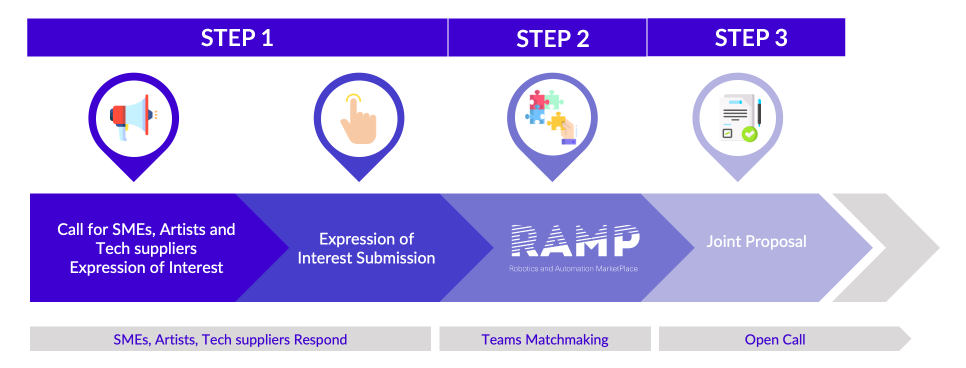Better Factory Open Calls
Better Factory will support pilot projects by teams composed of one manufacturing company, one artist, and one company supplying technology per Open Call. A total of 2 Open Calls will be launched to select the best 16 pilot projects, the so-called Knowledge Transfer Experiments (KTEs) during the lifetime of the project.
2nd Open Call now open!
Full proposals from Consortia of 1 Manufacturing SME or Mid-Cap, 1 Artist and 1 Technology Supplier:
- Opens – 1 September 2022
- Closes – 15 November 2022
The goal of the KTEs is to lead a diversification of the Manufacturing companies’ product portfolio with an aim to enhance their business models with customized and individualized products and new services around the products. KTEs will address the following sectors:
- Plastic and Rubber 🎈
- Furniture and Wood 🪑
- Food and Agriculture 🚜
- Construction 🏗
- Metal and Machinery ⚙
- Textile and Leather 👘
Up to EUR 200,000 (total lump sum) will be distributed to each one of the selected KTEs, based upon the successful delivery of technical and business reports along with the 16-month experiment program. KTEs applications will have to be submitted by consortia composed of:
- One Manufacturing company of Mid-Cap (up to EUR 50,000)
- One Technology supplier (up to EUR 100,000)
- One Artist (up to EUR 50,000)
Collaborations between Manufacturing Companies, Artists, and Technology Suppliers can take on many forms and deliver a wide variety of outcomes. At a technical level, the focus will be to minimise the impact on production cost and to create more value by:
- Reducing waste, energy and other production resources;
- Optimising factory logistics;
- Using robots to support workers;
- Production preplanning and simulation.
The Better Factory process
The first Better Factory Open Call process starts with a Call for Expressions of Interest from Manufacturing SMEs and Mid-Caps, and a Call for Experts from Artists and Tech suppliers. With the support of the Better Factory consortium, the pre-selected applicants follow a matchmaking process through the Robotics and Automation Marketplace (RAMP).
Expression of Interest
The Expression of Interest goal is to select the most innovative challenges proposed by manufacturing companies. At this stage, individual participants can apply to the Better Factory program. If pre-selected after this stage they will receive support to be matched and form a consortium.
Better Factory looks for Manufacturing companies and Mid-Caps willing to redesign their current products and services and to optimise their production cost.
Technology suppliers willing to support manufacturers digital transformation process into an agile production facility, which not only meets the current production demands but at the same time enables them to manufacture a range of new and personalised products.
Artists willing to redesign the products of manufacturing SMEs for personalisation around the core value proposition of the products, or design new products and services based on the core knowledge of the manufacturing company.

Matchmaking
The matchmaking process will be carried out in different steps for each stakeholder, where the best fitting interested parties will go through a pairing up process using the RAMP platform in order to find the best matches to bring their ideas to life.
As an outcome, teams composed of one manufacturing company, one artist, and one tech supplier will receive support from the consortium members to write a full proposal to submit during the Open Call stage of the initiative.
The final goal is to compete for one of the eight slots available for the funded Knowledge Transfer Experiments.
Stage 1 | Registration in RAMP. All pre-selected candidates -Manufacturing companies, Artists and Tech suppliers- must register themselves and/or their companies to start the match-making process. The participants can subscribe at any time during the matchmaking stage.
Stage 2 | RAMP Webinar. The RAMP webinar session will be held in order to present the platform to the participants and solve any questions and/or doubts on how to use the tools provided. After the general presentation, manufacturers will receive mentoring on how to define their challenges.
Stage 3 | Challenge invite days. The objective of this 2-day event is for Manufacturing companies to present their challenges and their individual context after the previous mentoring. At this stage, the participant companies will be introduced to the top 3 suitable Artists and Tech suppliers’ candidates – this selection will be in charge of experts from the Better Factory consortia.
After the introduction, Manufacturing companies must submit their challenges in written format to the RAMP platform.
Stage 4 | Artists and Tech suppliers support day. The Better Factory selection committees will be responsible to clarify doubts from the participants on how to best find their matches.
After clarifications, Artists and Tech suppliers must submit their answers to the Manufacturers proposed challenges.
Stage 5 | SMEs support day. Upon request from the manufacturing companies. The objective of this session is to provide feedback to the SMEs on their proposals. This process will allow them to define which teammates are best suited to help them carry out the proposed experiment.
Stage 6 | Match FIT feedback day. Upon request from the manufacturing companies. For this stage, manufacturers will invite/select the proposals of artists and tech suppliers that best fit their needs. The session will focus on meeting and discussing the objectives in order for all team members to be aligned on the same goals for their proposed Knowledge Transfer Experiment.
Final stage | Joint proposal. Manufacturing companies will select the final team members among the interested artists and tech suppliers, the goal is to form a consortium that will start to work on the proposal application for the First Open Call. The teams will be provided with support from members of the consortium with the objective of forming a team to create the best fitting experiment proposals that will be funded.
